Photographs: Uttam Ghosh/rediff.com Jitendra Kumar Gupta in Mumbai
Satyam Computer, Pyramid Saimira, KS Oils and Kingfisher Airlines are among those companies whose shares have fallen like eggs on the floor.
No doubt, every investor would have wanted to know beforehand, that these stocks would fall to ridiculously low levels. A look at many such cases shows there were clues, which if investors had followed, would have helped them avoid the losses.
One such clue is promoter holding. In all these cases, the promoters' holding was on the decline well before the fiasco struck.
...
How to exit stocks before they fall sharply
Photographs: Uttam Ghosh/Rediff.com
A look at the shareholding pattern of the last eight quarters shows there are 18 companies, where the holdings of the promoters and foreign institutional investors (FIIs) have fallen significantly.
And, in all these cases, retail investors' holding has gone up. Collectively, these 18 companies have seen FIIs' stake coming down by an average 785 basis points and promoters' stake falling by 955 basis points.
One percentage point is 100 basis points. On the contrary, public holding has risen by a whopping 1,091 basis points. In terms of loss, the share price of these 18 companies has fallen by an average 61 per cent beginning July 1, 2010, to October 8, 2012.
...
How to exit stocks before they fall sharply
Photographs: Uttam Ghosh/Rediff.com
| GETTING OUT | |||||||
| Companies | FII (%) | Fall in | Promoter's | Fall in | Public (%) | Fall in | % change |
| GTL | 15.76 | -14.53 | 52.83 | -11.66 | 9.27 | 11.89 | -92.9 |
| K S Oils | 44.61 | -22.32 | 36.32 | -27.89 | 8.67 | 36.53 | -91.6 |
| Sh.Ashtavinayak | 21.33 | -18.19 | 30.92 | -25.89 | 22.83 | 46.29 | -80.7 |
| Network18 Media | 23.31 | -5.03 | 59.25 | -9.70 | 9.81 | 9.66 | -79.6 |
| KF Airlines | 7.65 | -5.88 | 66.27 | -30.41 | 10.85 | 11.22 | -74.4 |
| Shriram EPC | 37.36 | -3.80 | 41.98 | -3.02 | 11.68 | 1.63 | -73.7 |
| Suzlon Energy | 11.02 | -3.70 | 58.14 | -5.38 | 21.24 | 8.56 | -69.8 |
| Prakash Inds | 14.75 | -11.87 | 50.29 | -3.80 | 15.59 | 6.37 | -68.1 |
| Educomp Sol | 38.72 | -11.88 | 49.82 | -0.59 | 7.06 | 9.04 | -67.4 |
| Varun Ship Co | 15.40 | -4.20 | 41.11 | -3.32 | 30.77 | 6.64 | -62.1 |
| Sujana Towers | 28.11 | -9.54 | 38.79 | -2.03 | 14.12 | 3.17 | -56.5 |
| JP Power Ven | 1.38 | -0.60 | 87.64 | -12.64 | 5.99 | 11.84 | -49.9 |
| Action Const Eq | 5.10 | -1.22 | 67.84 | -2.21 | 12.63 | 4.93 | -48.2 |
| Bilcare | 28.42 | -3.38 | 35.40 | -2.79 | 28.14 | 2.70 | -41.0 |
| Jindal Drilling | 10.72 | -6.92 | 74.93 | -21.10 | 6.27 | 9.36 | -40.6 |
| Gati | 15.73 | -12.33 | 49.04 | -4.66 | 26.76 | 9.34 | -37.0 |
| IL&FS Transport | 15.98 | -3.99 | 75.09 | -2.63 | 2.87 | 4.09 | -36.3 |
| Nucleus Soft | 8.40 | -1.91 | 59.53 | -2.09 | 19.37 | 3.18 | -34.2 |
| Average | 19.10 | -7.85 | 54.18 | -9.55 | 14.66 | 10.91 | -61.3 |
| % change in share prices reflects the fall in price between 1 July 2010 to 8 October 2012; Fall in holding has been measured between the September quarter of 2010 and June quarter of 2012 Source: BS Research Bureau | |||||||
How to exit stocks before they fall sharply
Photographs: Uttam Ghosh/Rediff.com.
However, a reduction in promoters' stake may not necessarily mean the promoters are selling.
The reduction in stake could also be the result of equity dilution, private equity placement or conversion of warrants into shares or if the pledged shares (owned by promoters) are offloaded in the open market by the lenders.
This is also why experts believe one cannot generalise. "One should assess companies on a case-to-case basis. Because, it is possible that a dilution (decline in stake) took place due to some other reasons rather the intent of the promoters to sell. But certainly, I would say, one should avoid companies frequently diluting the stake," says Ashish Chugh, investment analyst and author of Hidden Gems.
...
How to exit stocks before they fall sharply
Photographs: Uttam Ghosh/Rediff.com.
Institutional investors and promoters (or promoter entities) are usually the first to know if something good or bad is happening in a company.
This is also a reason why they are known as insiders and market participants believe investors should be cautious when they (promoters and institutions) are selling. Ignoring such events, many investors make the mistake of buying a stock when it is correcting (falling) hoping recovery will eventually take place. And when things do not improve as hoped, investors end up with heavy losses.
"Some retail investors jump to buy a stock when it falls to ridiculous levels, arguing how bad could it get. This leads to a lot of accumulation by the retail investors, which is not good," says Motilal Oswal, chairman and managing director (CMD), Motilal Oswal Financial Services.
...
How to exit stocks before they fall sharply
Photographs: Uttam Ghosh/Rediff.com
"It's a trap. Retail investors keep on buying and averaging shares in the hope of recovery and get stuck in poor quality stocks where FIIs and promoters smartly offload their shares. One should be careful and if at all buying such companies they should not put more than 15 per cent of their capital," says S P Tulsian of sptulsian.com.
In March 2008, promoters' holding in Pyramid Saimira was 54.19 per cent and the share price hovered around Rs 300.
While the shares last traded at Rs 5.29 on February 23, 2011, before trading was suspended, the promoters' holding started declining from the June 2008 quarter and stood at 19.99 per cent (according to the last reporting in March 2010).
In terms of number of shares, it fell by 60 per cent to 5.9 million shares between March 2008 and March 2010. The biggest victims were the small investors, whose holding went up to 80 per cent from 45.8 per cent in March 2008.
...
How to exit stocks before they fall sharply
Photographs: Uttam Ghosh/Rediff.com.
In the case of Satyam Computer though, investors were protected to some extent as a result of the takeover by Tech Mahindra.
But in that case, too, promoters' holding had fallen from nine per cent levels (around May 2008 when the share price was over Rs 500) to two per cent by the time the Satyam fiasco took place (early 2009).
In fact, the number of shares held by the promoters was slowly, though marginally, declining before falling sharply from 58 million at end-September 2008 to 14.67 million at end-December 2008.
...
How to exit stocks before they fall sharply
Photographs: Reuters.
Hoping for recovery without any fundamental reason is not a good idea. Because, it is possible a Rs 100 stock could become Rs 10 and finally get suspended due to no activity at the counter.
"It has been happening for quite a while now and retail investors have become victims. In fact, there is a list of recently suspended 1,600 scrips. If you observe, in all of these cases the promoters have sold their stakes till it became nil and retail investors have bought and become the victims," says Kishor Ostwal, CMD of CNI Research.
Ostwal suggests investors typically do not have enough ammunition to safeguard their capital. To do so, they could keep an eye on promoters' activities (in terms of selling their holding) or put a cap on promoter stake falling below say 25 per cent, which will to some extent limit the downside.

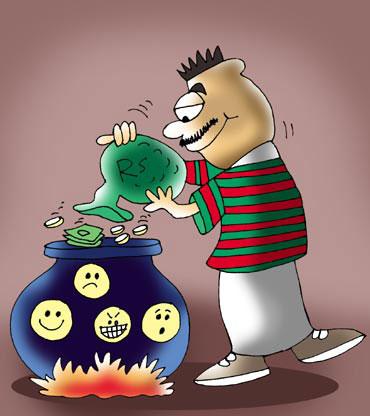

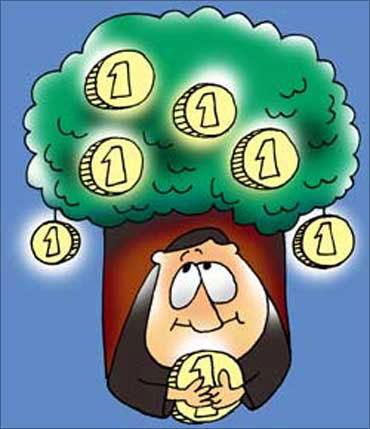
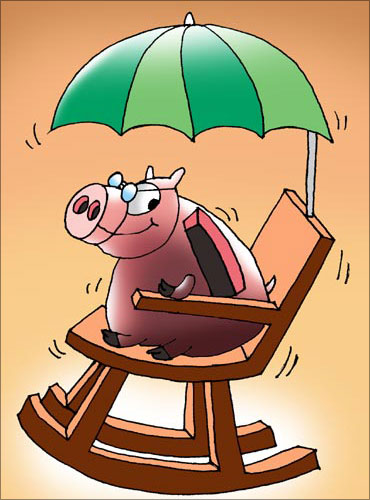
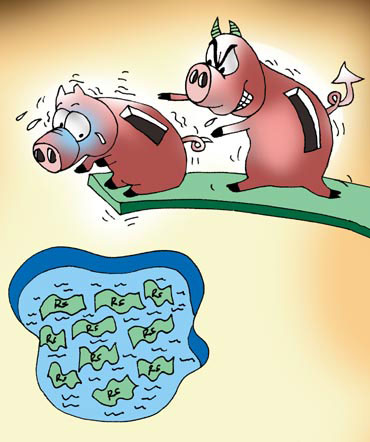

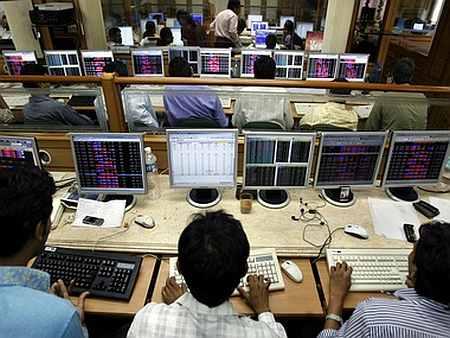

article